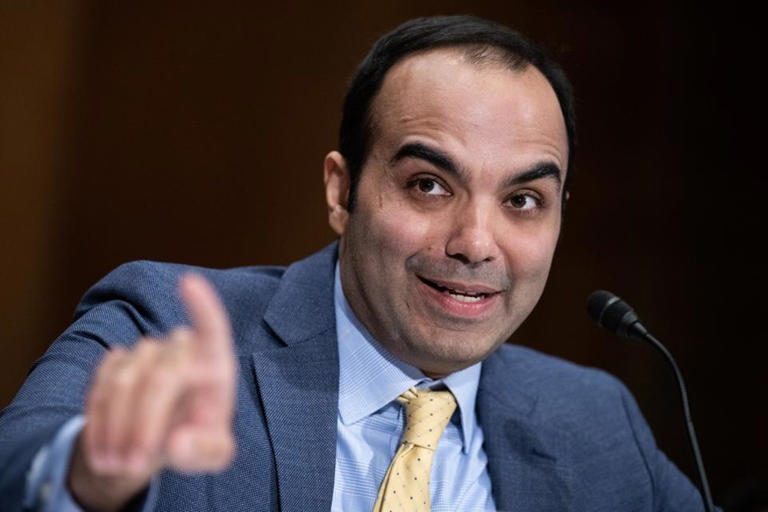The Consumer Financial Protection Bureau (CFPB) has taken a significant step to reduce credit card late fees by finalizing a rule that will lower the average fee from $32 to $8. This move is estimated to save consumers a substantial $10 billion in late fees. However, critics are expressing concerns about potential repercussions, particularly how banks might offset the loss of fee revenue.
Credit card late fees have been regulated since the passage of the 2009 Credit Card Accountability Responsibility and Disclosure (CARD) Act. This legislation mandates clear disclosure of associated fees and prohibits excessive penalties. In 2010, the Federal Reserve implemented a regulation stipulating that banks could only charge fees to cover the costs of recovering a late payment. It included a safe harbor provision establishing thresholds for late fees: $25 for the first late payment and $35 for subsequent late payments. These thresholds have been annually adjusted for inflation and have now risen to $30 for the first late payment and $41 for subsequent late payments.
CFPB Director Rohit Chopra has criticized the practice of charging late fees, particularly in cases where payments are only slightly late or when circumstances beyond the consumer’s control lead to the delay. He highlighted the additional burden imposed by extra interest charges, negative credit reporting, and other adverse consequences associated with late payments.
The CFPB’s efforts aim to provide relief to consumers burdened by high late fees while promoting transparency and fairness in credit card practices. However, concerns persist about potential strategies that banks may employ to compensate for the loss of fee revenue, underscoring the need for ongoing oversight and regulation in the financial industry.
The new rule proposed by the Consumer Financial Protection Bureau (CFPB) marks a significant shift in credit card late fee regulations. Initially introduced in February of the previous year, this rule will lower the safe harbor threshold to $8 and eliminate automatic inflation adjustments for issuers with over one million open accounts, encompassing more than 95% of outstanding card balances.
Currently, the credit card industry generates over $14 billion in late fee revenue annually. CFPB research indicates that this figure is more than five times the actual costs incurred by banks in collecting late payments. Under the new rule, the safe harbor threshold will be substantially reduced, reflecting a move towards greater consumer protection and fairness in fee structures. The rule is set to take effect 60 days after its publication in the Federal Register, although it has not yet been posted at the time of writing.
However, the banking industry is voicing strong opposition to the CFPB’s initiative, raising concerns about potential adverse consequences for consumers. The argument put forth by the Bank Policy Institute (BPI) suggests that lowering late fees may fail to deter consumers from paying late, potentially leading to an increase in missed payments. This, in turn, could result in lower credit scores and reduced access to credit for consumers across the credit spectrum.
Furthermore, the BPI warns of potential repercussions on subprime borrowers, suggesting that cards designed for this demographic could experience heightened interest rates and additional fees as banks seek to offset lost late fee revenue. Additionally, the BPI posits that prime credit cardholders may see cutbacks in rewards programs as issuers adjust to the loss of fee income.
Overall, the CFPB’s new rule has sparked a contentious debate between consumer advocates seeking enhanced protections and industry stakeholders expressing concerns about unintended consequences on the credit landscape.
The Consumer Financial Protection Bureau (CFPB) contends that banks have developed a profit model centered around collecting punitive late fees. However, Alan Kaplinsky, Senior Counsel of Ballard Spahr’s Consumer Financial Services Group, offers a counterargument, suggesting that collection costs and charge-offs resulting from late payments represent the worst outcome for banks.
Kaplinsky asserts that credit card issuers prioritize timely payments and do not benefit from customers paying late. Late payments often result in increased collection efforts and, ultimately, some customers defaulting on their debts, leading to charge-offs. This perspective challenges the notion that late fees serve as a lucrative profit center for banks.
The announcement of the finalized rule coincided with several other actions aimed at addressing unfair fees across various industries, aligning with the Biden Administration’s focus on promoting competition in the American economy. These efforts target undisclosed “junk fees,” including those attached to ticket prices or resort fees.
While junk fees are characterized by inadequate disclosure and may involve deceptive practices, late fees have traditionally been transparently disclosed upfront. Kaplinsky emphasizes that late fees are widely understood by consumers, contrasting them with the concept of junk fees.
Despite the CFPB’s finalization of the rule, there remains the possibility of legal challenges from major banks or industry groups. The bureau has faced previous legal battles initia
ted by powerful industry players, exemplified by a Supreme Court case questioning its funding structure, brought forth by two payday lending trade groups in the preceding year.
